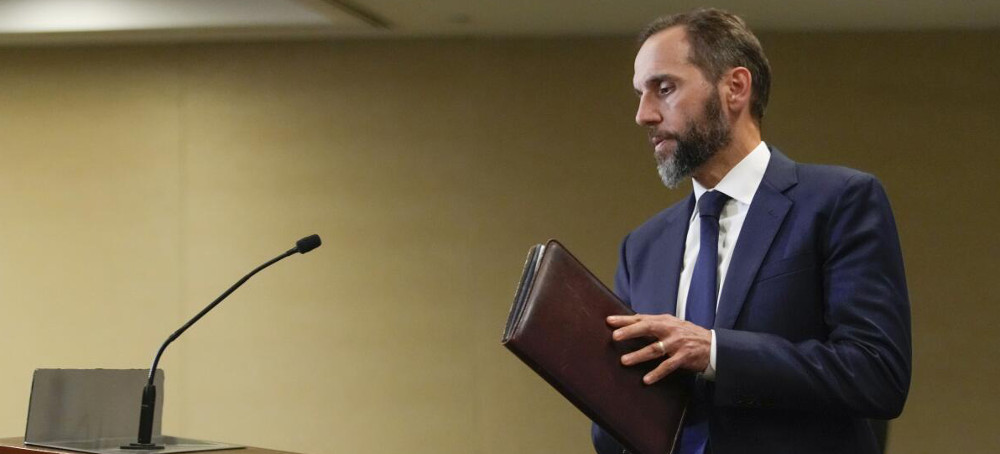How Jack Smith Just Called Out Judge Aileen Cannon in the Trump Classified Records Case
Harry Litman Los Angeles Times Special counsel Jack Smith has responded to an unusual order in the classified records case against former President Trump. (photo: Jacquelyn Martin/AP)
Special counsel Jack Smith has responded to an unusual order in the classified records case against former President Trump. (photo: Jacquelyn Martin/AP)
ALSO SEE: Trump Special Counsel Fires Back at Cannon Order That Could Disrupt Case
Late Monday, the special counsel responded to U.S. District Judge Aileen Cannon’s bizarre recent order in the classified records case against Donald Trump, which asked the parties to propose jury instructions based on flagrantly wrong legal premises. Smith’s answer, in effect, was “I’m not playing.”
Rather than take on Cannon’s cockamamie assignment, Smith laid out accurate jury instructions based on the actual charges and law.
Cannon had ordered the parties to “engage with” the Trump team’s recurrent misinterpretation of the Presidential Records Act, which has no legal bearing on the case. Her order also depended on an account of the facts — namely, that Trump may have magically converted all the classified government records at issue into his personal property as he left the White House — that has always been beyond incredible.
In effect, Cannon was ordering the Justice Department to assume that the world is flat and then map a route from Atlantis to Arcadia.
But the order wasn’t just daffy; it was pernicious.
As I explained when the judge entered the order, her “Alice in Wonderland” antics seemed designed to avoid issuing a ruling that prosecutors could appeal while also setting the stage for her to adopt Trump’s ridiculous claims after a jury has been impaneled.
That could be a fatal blow to Smith’s case. Once a jury is selected, even a ridiculous order can bring a prosecution to a hard stop because the Constitution’s double jeopardy clause precludes retrial. It would be the judicial equivalent of a perfect crime.
Along with much of the country, the special counsel has no doubt watched in frustration as Cannon has repeatedly indulged silly arguments from Team Trump while eating up weeks and months that prosecutors — and voters — don’t have. She has taken a cut-and-dried case based on overwhelming evidence and made it a long shot to be tried this year, when it matters most.
Her conduct has raised the question of when and how Smith could ask the 11th Circuit Court of Appeals to remove her from the case. That would be a heavy lift, and yet Cannon’s earlier bungling of a search warrant in the case was so extreme that another grievous error could justify such an unusual remedy.
But Cannon has seemed to play a kind of cat-and-mouse game with the prosecution, favoring Trump with delays while avoiding definitive rulings that Smith’s team could readily appeal.
The special counsel’s latest filing suggests the end of the game may be near. The government’s 24-page answer states flatly that the judge’s “legal premise is wrong, and a jury instruction … that reflects that premise would distort the trial.” Under the usual rules of discourse between judge and litigants (and especially federal prosecutors), that’s pretty cheeky.
But it was just the beginning of Smith’s pushback. The special counsel proceeded to instruct the judge — again contrary to normal etiquette — that it is “vitally important” that the court make a decision about Trump’s Presidential Records Act arguments. In other words, Cannon’s precious thought experiment was not only wrongheaded; it was a dereliction of the court’s basic responsibility to rule on the parties’ motions.
The Justice Department is turning the tables on Cannon by telling her to just decide the matter already. Smith’s team also put the need for a speedy trial in particularly clear terms: “Whatever the court decides, it must resolve these crucial threshold legal questions promptly. Failure to do so would improperly jeopardize the Government’s right to a fair trial.”
The prosecution further called out Cannon’s threat to issue a consequential ruling after a jury is impaneled, writing, “The Government must have the opportunity to consider appellate review well before jeopardy attaches.”
The Smith team then made its most important and aggressive move by noting that when judges have issued clearly erroneous jury instructions that doom prosecutions, “courts have permitted the government to obtain writs of mandamus.”
Even buried in a parenthetical as it is, the word “mandamus” jumps off the page as a threat to seek an extraordinary intervention by the appellate court. Smith has laid down the gauntlet, telling Cannon in no uncertain terms that if she doesn’t move to resolve Trump’s frivolous arguments well ahead of trial, he will bring a writ of mandamus to the 11th Circuit along with a motion to recuse her from the case. Providing this road map of his intentions puts Smith on firm footing to challenge the judge if she continues to dither.
For that reason, this brief is the special counsel’s most important in the case since the indictment. Under the circumstances, it’s the strongest possible move to speed the prosecution to a trial before the election. Either Cannon will move the case along, or the department will try to remove her from it.



